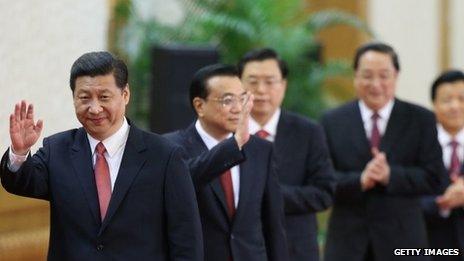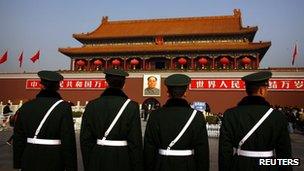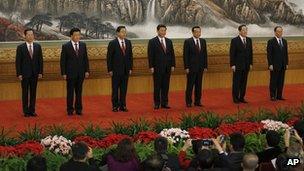Will China's Xi Jinping be different?
- Published
- comments

Mr Xi is being seen as more relaxed and at ease than previous leader Hu Jintao
As Xi Jinping walked out to be presented as China's new leader, one thing was immediately clear to all of us waiting in the Great Hall of the People. His will be a different style of leadership from that of his predecessor Hu Jintao.
Mr Xi was immediately more relaxed and at ease than the man he had just replaced as general secretary of China's Communist Party. Where Mr Hu often appeared stiff and wooden, Xi Jinping smiled and even apologised for keeping his audience waiting.
If he was nervous or awed by the prospect of ruling over one-fifth of humanity, there was no sign of it. At one point, he even seemed to become a little emotional while he was delivering his speech.
Perhaps it is Xi Jinping's pedigree as a Communist Party "princeling" - his father was a revolutionary hero alongside Mao Zedong and a powerful figure in the party - that means he seems more comfortable in his own skin.
Certainly, Xi Jinping has worked all his life for this moment. Rising through the party, he's been groomed for the top.
'More personality'
And when he spoke, Mr Xi seemed to signal a new tone, too. He was more direct, more plain-speaking, more blunt.
There was still some of the jargon of old, that the party must "continue to liberate our way of thinking... further unleash and develop the productive forces... and steadfastly take the road of prosperity for all".
The content was similar to Hu Jintao's outgoing speech last week. But it still sounded different when Xi Jinping warned "the problems among party members and cadres of corruption, taking bribes, being out of touch with the people, undue emphasis on formalities and bureaucracy must be addressed with great efforts".
Mr Xi tried to show he understands the bread-and-butter issues that most people care about. "Our people... yearn for better education, stable jobs, more satisfactory income, greater social security, improved medical and healthcare," he said.
Bo Zhiyue of the National University in Singapore says Xi Jinping will be a different type of leader.
"He has more personality. He is a regular person. He can work with anyone he meets. He is a very down-to-earth person. He is easy to get along with."
Political personality
But, of course, substance and results will matter more than style. On that score there was no detail, no policy proposal, no idea how he will bring about the changes he talked of.

A change of power in China is rare, as it happens only once a decade
But if Mr Xi is able to connect with China's people in a way Mr Hu couldn't, that will be important. It may give him more room to carve out a political personality of his own that would give him more authority as leader.
What will matter, then, is what sort of vision he has for China: something we simply don't know.
There is, of course, a temptation to read too much into tiny things. A change of power in China is rare, it happens only once a decade. Every time there are hopes the new leaders will bring change.
A little more than a decade after the trauma of the Tiananmen massacre, when Hu Jintao came to power, he was seen as a possible reformer.
Now, though, as his decade has drawn to a close, his time is widely seen as a missed opportunity and attention has turned to the new generation.
'Very smart'
Xi Jinping has risen to the top by keeping a low profile, says Minxin Pei of Claremont McKenna College in California.
"Very few people know about who China's new leader will be, what he thinks. It's very smart for any incoming leader not to show his cards, and he's very smart."
And he says the fact that Mr Xi is the first among equals in a new Standing Committee of seven will also make this leadership inherently conservative.
"The new leadership looks in all likelihood to be a carefully balanced coalition, and a carefully balanced coalition is not a structure that is conducive to very decisive policy making," he added.

The Politburo Standing Committee now has seven members
The reduction in the Standing Committee from nine to seven men may make it easier to reach consensus and so take some tougher decisions. The past decade is widely seen as one of paralysis. But on that score, we'll have to see.
What we do know from the other six new leaders is that they seem to contain a balance - the product of months of secret negotiations and compromises.
Some are from the supposed Jiang Zemin faction, some from the Hu Jintao faction, some may be conservative-minded and unwilling to pursue reforms, others are more reformist economic managers.
There are "princelings" and those from more humble backgrounds.
The message to take away from this is that compromise and consensus seem to be the order of the day.
It is worth noting that the candidates said to be most in favour of reform, like Wang Yang and Li Yuanchao, did not make it into the final seven. Both are young enough that they could still be elevated to the Standing Committee in 2017.
But it means the final line-up is being seen as relatively conservative, and less inclined towards change.
However the five new members on the Standing Committee are all relatively old. They may all serve only one term and have to retire in five years' time. Xi Jinping and the new number two, Li Keqiang, will be around for 10 years.
So the day in five years' time, when Xi Jinping leads out the members of the next Standing Committee from behind that closed door, may be the day when he really cements his authority as China's leader.